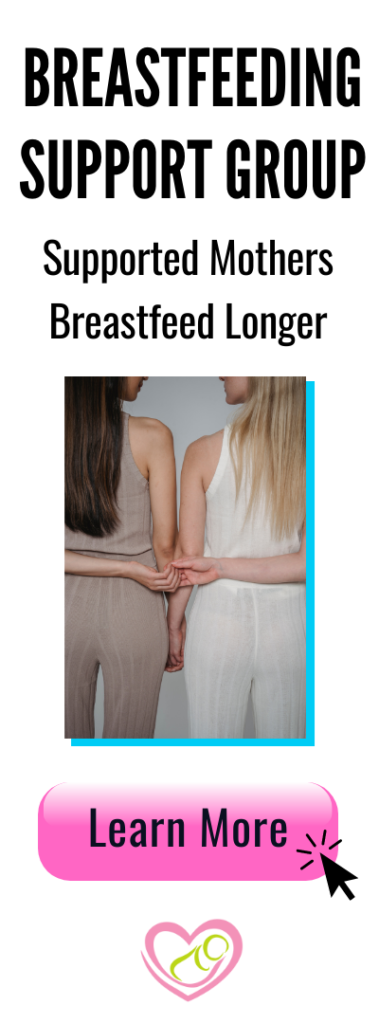How To Manage Nursing A Distractible Baby
April 21, 2022 2024-06-20 17:00How To Manage Nursing A Distractible Baby
Nursing A Distractible Baby

Finding it hard to breastfeed your little one? Are they starting to squirm, pull away, or get easily distracted by what’s around them? While you may be concerned at first, do not worry! This is a common occurrence in infants that can start as early as 3 months, and peaks between 6-12 months of age. Keep reading to learn how to manage nursing during this phase.
Why Is My Baby Distracted?
Distractibility is a sign that your infant’s brain is developing! It happens as a result of increased awareness of their environment. As they gain the ability to control their eye movements and develop proper depth perception, they are finally beginning to see the world as we do. It’s a lot to take in! Increased distraction may also occur during developmental leaps when they learn a new skill such as crawling, sitting or walking. You may also notice changes in their sleeping pattern during these leaps as well.
Does This Mean My Baby Is Ready To Wean?
It is very rare for infants to start to wean before 12 months of age. A distracted baby does not mean they are no longer interested in nursing. Keep in mind that your child is now a much more efficient nurser in comparison to when they were a newborn. They may be nursing for shorter periods of time, but this does not mean they are no longer interested. In fact, your baby is getting more milk than before during these short nursing sessions. You may find them having short feedings during the day, and longer ones at night.
How Can I Nurse An Easily Distracted Baby?
Limiting distractions is one of the best ways to help your baby focus on nursing. Try out these tactics:
- Breastfeed in a quiet, darkened room, away from others.
- Speak softly, or stay quiet during the feeding if your little one is easily distracted by noises.
- If unable to feed alone in a room, try using a nursing cover or sling to help your infant focus on the feeding and not on their surroundings.
- Nurse in motion such as by walking or rocking while feeding.
- If you are going out, breastfeed before you leave so you can control the amount of stimuli in the environment.
Do What Works For Your Baby
If you find your baby eats better at night, you can try to increase night time feedings to ensure that they are getting enough milk if they are frequently distracted during daytime feedings. Remember, it is the total caloric intake over 24 hours that matters, not the amount of times that your infant breastfeeds. In fact, older babies may even consume up to 25% of their caloric intake during the night!
Troubleshooting
Is your baby pulling and biting on your nipples? This can be due to boredom or distractedness. Be prepared to insert your finger into the corner of your baby’s mouth to break suction if your infant is pulling away during breastfeeding. Watch out for signs of boredom which is generally at the end of a breastfeeding session, and a common time that biting occurs. If this is the case for your child, gently remove them from the breast if you notice boredom.
Still noticing your infant is frequently distracted or squirming? Try these tips:
- Older infants may prefer positions where they have more control, such as sitting or standing.
- If nursing sessions are shorter that normal, offer the breast more often, even if they are not asking for it.
- Sometimes, offering a favorite toy or blanket during breastfeeding sessions that you can incorporate in your breastfeeding routine can be helpful.
- Try minimizing your own distractions such as the television or your phone and focus your attention on your infant. You are very interesting to your baby, and they can tell if you are distracted!
Remember, distractibility is a normal phase of infancy. However if you feel like they are not getting enough to eat and you are struggling for an extended period of time, please reach out to a lactation consultant. We can help you protect your supply, uncover any possible underlying feeding issues, and help keep your baby adequately nourished in the meantime. We are always here to help you!
***The information provided on our website is intended solely for general educational and informational purposes only. It is neither intended nor implied to be a substitute for professional medical advice. Always seek the advice of your physician for any questions you may have regarding your or your child’s medical condition. Never disregard professional medical advice or delay in seeking it because of something you have received in this information.***
Search
baby bottle feeding breastfeeding breastfeeding latch breastfeeding pain breast milk storage breast refusal bugs cedar park regional clogged duct contraceptives daycare discharge doula engorgement exercise foremilk galactogogues hindmilk hospital how to latch baby labor low milk supply low supply massage mastitis newborn care nursing strike nutrition pacifiers plugged duct plugged ducts postpartum prenatal pumping relactation siblings sleep sore nipples breastfeeding suck training tax breaks thrush tongue tie video weaning
Search



